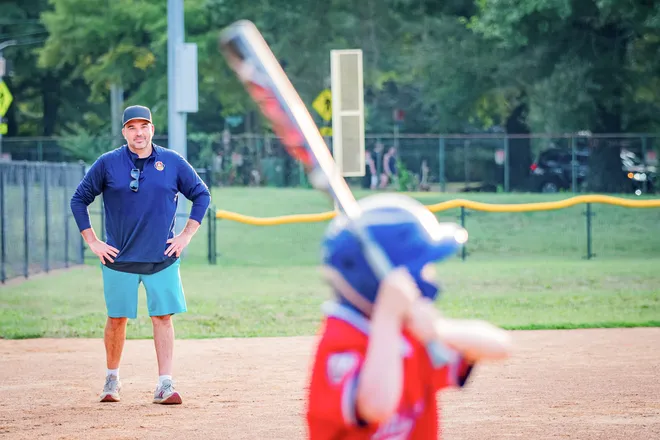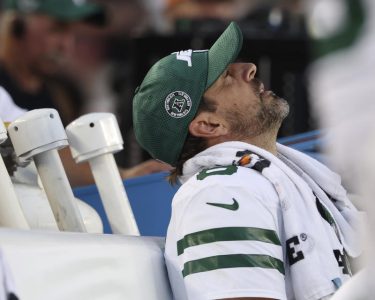In the world of youth sports, few names stand out like Michael Umpierre. Crowned Little League’s Coach of the Year in 2024, Umpierre’s approach to coaching is not just about winning games—it’s about fostering growth, building character, and instilling life lessons that go far beyond the baseball diamond. His mantra, “Let’s EAT!”, has become a rallying cry not just for his team, but for parents and young athletes across the country.

The EAT Philosophy: More Than Just a Catchphrase
So, what does “Let’s EAT!” really mean? According to Umpierre, it’s an acronym that stands for Effort, Attitude, and Teamwork—three pillars that he believes are crucial to success in both sports and life.
Effort: Umpierre emphasizes that talent can only take an athlete so far. The real differentiator is effort. “I tell my players, you don’t have to be the best on the field, but you have to give your best effort every single time,” he says. This mindset encourages young athletes to focus on what they can control: their level of commitment and hard work.
Attitude: The next component, attitude, is equally important. Umpierre teaches his players that a positive attitude can turn challenges into opportunities. “When you strike out or make an error, your attitude determines whether you let it break you down or build you up,” Umpierre explains. He encourages parents to reinforce this at home, reminding kids that how they respond to adversity shapes their overall experience.
Teamwork: Lastly, teamwork is the glue that holds it all together. Umpierre believes that understanding the value of working together is essential, not just in sports but in every aspect of life. “We win as a team, we lose as a team, and we grow as a team,” he says. He urges parents to remind their children that being part of a team means supporting others and recognizing that everyone has a role to play.
Building Resilience: Lessons Beyond the Game
One of Umpierre’s core beliefs is that sports should teach kids resilience. In today’s world, where many children are shielded from failure, Umpierre encourages a different approach. He believes that experiencing and overcoming challenges on the field prepares kids for the ups and downs of life. “If we don’t let our kids fail, we’re doing them a disservice,” he asserts. “Sports give them a safe space to learn how to handle setbacks and come back stronger.”
Umpierre shares a story about a player on his team who struggled at the beginning of the season. Instead of benching the player or giving up on him, Umpierre worked closely with him, focusing on effort and attitude. By the end of the season, the player had improved significantly, both in skill and confidence. “That’s what it’s all about,” says Umpierre. “It’s not just about winning games; it’s about winning in life.”
The Role of Parents: Partners in the Process
Umpierre is quick to point out that coaches aren’t the only ones who play a critical role in a young athlete’s development. Parents are key partners in the process, and their involvement can make all the difference. However, he cautions against being too overbearing or placing undue pressure on kids.
“Parents need to be supportive without being overbearing,” Umpierre advises. “It’s important to let kids have fun and enjoy the game. If they’re not having fun, they’re not going to want to keep playing.”
He encourages parents to focus on the positives and to be their child’s biggest cheerleader, no matter the outcome of the game. “Celebrate the effort, celebrate the teamwork, and celebrate the attitude,” he says. “Those are the things that matter most in the long run.”
Encouraging Healthy Habits: On and Off the Field
Another aspect of Umpierre’s coaching philosophy is the emphasis on healthy habits, both on and off the field. He believes that physical activity, proper nutrition, and mental well-being are all interconnected and that developing these habits early can set kids up for a lifetime of success.
“Sports aren’t just about what happens during practice or games,” Umpierre explains. “It’s also about how kids take care of their bodies and minds outside of sports.” He advocates for balanced meals, regular physical activity, and sufficient rest, emphasizing that these are just as important as practicing skills or learning plays.
Umpierre also touches on the importance of mental health. He recognizes that the pressure to perform, whether academically or athletically, can take a toll on kids. “It’s okay to take a break, to talk about feelings, and to ask for help when needed,” he says. “Being mentally strong is just as important as being physically strong.”
Setting Realistic Goals: The Path to Success
Umpierre advises both parents and coaches to help kids set realistic, achievable goals. These goals should be specific, measurable, and within the child’s control. “Instead of saying, ‘I want to win the championship,’ a better goal might be, ‘I want to improve my batting average by the end of the season,’” he suggests. “It’s about focusing on progress, not perfection.”
By setting and achieving small goals, kids can build confidence and see tangible improvements over time. Umpierre believes that this approach helps children develop a growth mindset, where they understand that effort and persistence lead to improvement.
EAT and Grow Together
As the Little League Coach of the Year, Michael Umpierre’s advice resonates far beyond the baseball field. His EAT philosophy—Effort, Attitude, and Teamwork—offers valuable life lessons that can benefit any young athlete. Parents, coaches, and players alike can learn from his approach, which emphasizes personal growth, resilience, and the importance of having fun while working hard.
So, the next time your child steps onto the field, remember Umpierre’s words: “Let’s EAT!” Encourage them to give their best effort, maintain a positive attitude, and work together with their teammates. In doing so, they’ll not only become better athletes but also better people.
For more inspiring stories and insights from the world of sports, check out Digital Digest’s comprehensive coverage. Stay tuned for the latest news, expert advice, and in-depth analyses on all things sports-related.




